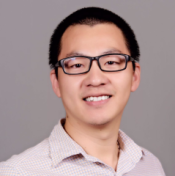ASU professor aims to grow social work profession among Asians, Pacific Islanders

The Asian and Pacific Islanders Social Work Educators Association, whose president is ASU Associate Professor Shiyou Wu, will hold its annual conference in Chengdu, China, on May 31-June 3. Educators from 12 nations will attend and discuss spreading social work research and practice in Asia and the Pacific Rim. Photo by SeanPavonePhoto/iStock
Practiced widely in Western countries, social work is still developing in Asia and the Pacific Rim, where professionals seek to better assist people living in those nations, said an Arizona State University associate professor who is chairing an upcoming global gathering in China of social work professionals.
ASU is a key sponsor of the Asian and Pacific Islanders Social Work Educators Association, or APISWEA’s, 2024 international conference. The conference will welcome educators from 12 nations May 31–June 3 in Chengdu, the capital city of the Chinese province of Sichuan.
The conference theme is “Transforming Evidence into Practice.” It will feature global experts, practitioners and scholars focused on issues facing Asian and Pacific Islander communities, said Shiyou Wu, an associate professor in ASU's School of Social Work and the APISWEA president.
School of Social Work Director and Distinguished Professor of Social Policy Elizabeth Lightfoot will deliver a keynote address to the conference and share knowledge about social work doctoral education in the United States.
Wu says conference attendees will enhance how they train social work students, as well as learn how to conduct rigorous research, integrate practice with students’ field education and career development, and effectively write and publish papers in academic journals published in English.
“Given that social work in many API (Asian and Pacific Islander) countries are still in a developmental phase, participating in this conference offers a valuable opportunity for attendees to glean insights from scholars and practitioners from the well-developed countries in social work, such as the United States and Austria,” Wu said.
Past conferences have been held in many locations, including Vietnam, the Philippines, Thailand, South Korea and Hong Kong. The 2025 international conference will be in Indonesia.
The organization regularly organizes academic collaborations and career counseling activities, according to Wu. APISWEA is responsible for abstract reviews and for hosting presentations at the Asian and Pacific Islander Forum during the annual conference of the Council on Social Work Education in the United States. Each year, the association also awards two doctoral scholarships for research on API-related topics.
Despite different speeds of development in the field, the needs social workers face are much the same in all nations, Wu said. “Aging, depression, addiction … the same.”
Wu said he hopes the American public understands how challenging it is for Asian and Pacific Islander social workers to talk about issues affecting people who are of API origin, given increases in anti-Asian behavior in the United States since the COVID-19 pandemic.
Lightfoot said Wu is quickly becoming an international leader in social work education, due in no small part to his ability to organize a scholarly gathering of this size more than 7,400 miles from Phoenix.
“The School of Social Work is happy to be the key sponsor of the APISWEA conference, as it fits with our school's strong interest in international social work,” Lightfoot said. “Over half of our social work faculty have international scholarly connections, and we believe the international exchange of knowledge is important for increasing global awareness.”
The School of Social Work is part of the Watts College of Public Service and Community Solutions.
More Local, national and global affairs

ASU Library collection captures robust history of Arizona
Editor’s note: This is part of a monthly series spotlighting ASU Library’s special collections throughout 2024.Copper, cattle, cotton, citrus and climate.The so-called “five Cs” of Arizona…

ASU helps University of Guyana faculty earn doctoral degrees in expedited program
Shenella Benjamin and Norwell Hinds joined hundreds of other Sun Devils in receiving PhDs from Arizona State University this week, but their journeys were unique.Benjamin and Hinds, both of whom are…

School of Public Affairs surveys thousands of Arizona lawyers, other legal professionals for state bar
When the State Bar of Arizona decided to learn what its members thought about disciplinary procedures, it needed someone to poll its nearly 25,000 lawyers and other legal professionals.The bar…
